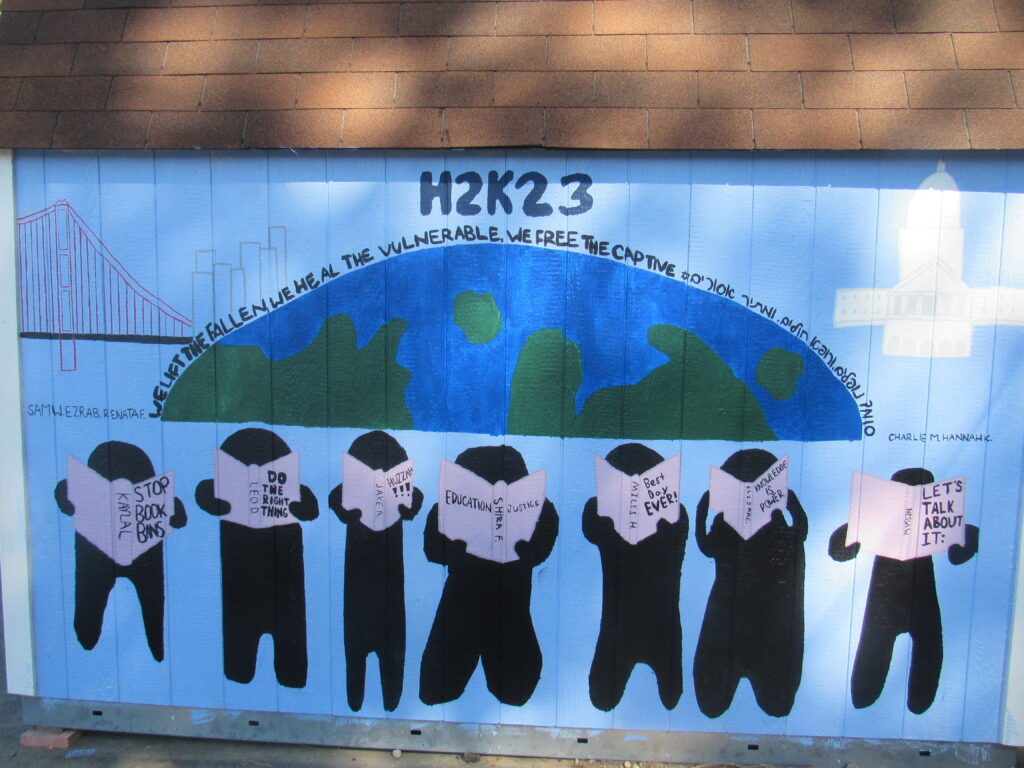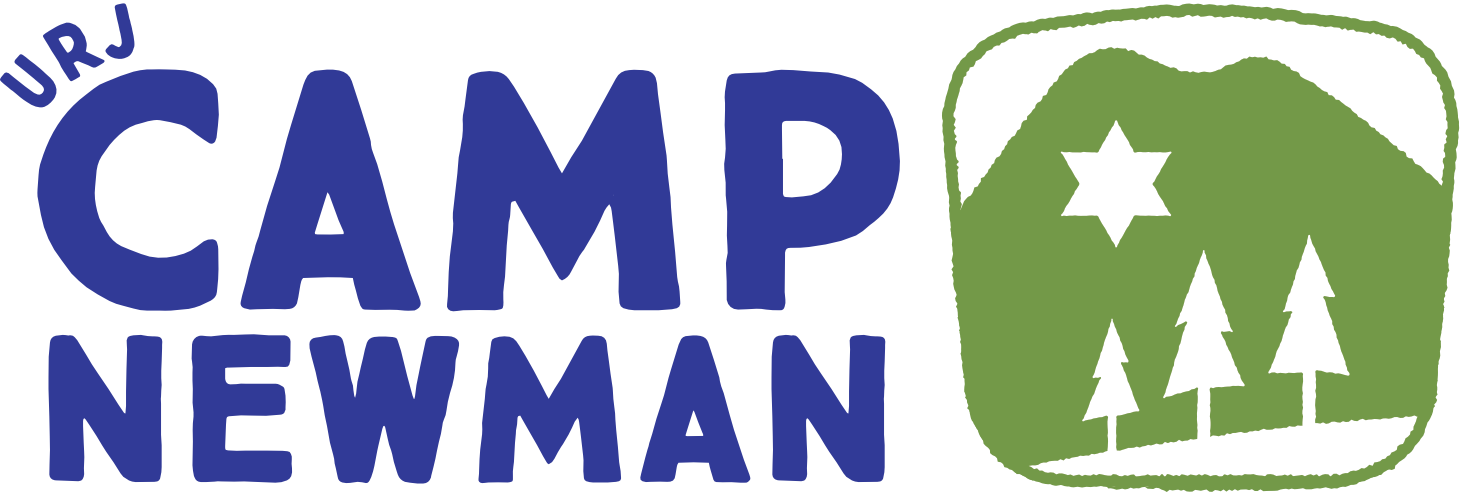by Renata Feinstein, Hevrah Rosh Eidah ’22 & ’23 and Shira F., Hevrah Camper ’23
This summer I had the privilege of being the Rosh Eidah, or Unit Head, for Hevrah, our month-long session focused on social justice for campers entering 10th and 11th grade. Each summer Hevrah focuses on a specific issue, and this year we chose educational justice, with a focus on the written word. Campers spent the month learning about the issue – through the lens of history, current events and Judaism – as well as the different ways they can effect change: indirect service, direct service, and advocacy. They took action by hosting a book drive, volunteering at GLIDE Memorial Church in San Francisco, and lobbying state legislative staff members in Sacramento, all while also getting the chance to participate in traditional camp activities like frisbee and circus arts.
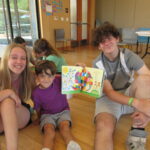 These experiences enabled Hevrah teens to both serve and advocate, providing them with the opportunity to turn their learning into action. Campers brought the Newman community together by planning and hosting a book drive for the Jewish Coalition for Literacy. We met with many campers and their families, who generously donated their books to our cause.
These experiences enabled Hevrah teens to both serve and advocate, providing them with the opportunity to turn their learning into action. Campers brought the Newman community together by planning and hosting a book drive for the Jewish Coalition for Literacy. We met with many campers and their families, who generously donated their books to our cause.
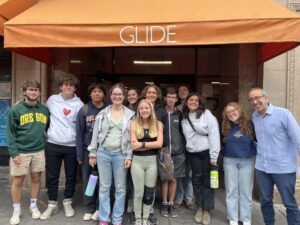 One of the most special parts of Hevrah is its tradition of going off-site, and we were able to make two trips this summer. In San Francisco we met with Rabbi Michael Lezak at GLIDE Memorial Church, helped serve meals in their soup kitchen, and took a tour of the Tenderloin neighborhood. In their reflections on the experience, campers described the visit as being “incredibly impactful” and that it made them more “open-eyed to the communities around [them].” One camper wrote that “seeing the people I served food to also made the experience of helping at GLIDE much more meaningful. I felt like I was a part of really making a difference in these peoples’ lives, even if it was just giving them one less thing to worry about.” Many campers also wrote about looking forward to the next time they can volunteer at GLIDE.
One of the most special parts of Hevrah is its tradition of going off-site, and we were able to make two trips this summer. In San Francisco we met with Rabbi Michael Lezak at GLIDE Memorial Church, helped serve meals in their soup kitchen, and took a tour of the Tenderloin neighborhood. In their reflections on the experience, campers described the visit as being “incredibly impactful” and that it made them more “open-eyed to the communities around [them].” One camper wrote that “seeing the people I served food to also made the experience of helping at GLIDE much more meaningful. I felt like I was a part of really making a difference in these peoples’ lives, even if it was just giving them one less thing to worry about.” Many campers also wrote about looking forward to the next time they can volunteer at GLIDE.
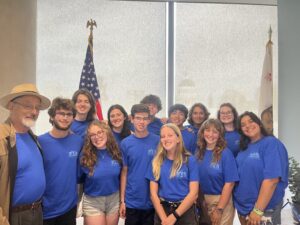 In Sacramento we met with three different state legislative offices to talk about Assembly Bill (AB) 1078, which aims to prevent schools from banning books and other instructional materials and to ensure that students receive a diverse and culturally competent education. Campers advocated for AB 1078 and for equitable education, spoke with legislative staffers about their own educational experiences, asked informed questions, and learned about different roles working with the government in Sacramento.
In Sacramento we met with three different state legislative offices to talk about Assembly Bill (AB) 1078, which aims to prevent schools from banning books and other instructional materials and to ensure that students receive a diverse and culturally competent education. Campers advocated for AB 1078 and for equitable education, spoke with legislative staffers about their own educational experiences, asked informed questions, and learned about different roles working with the government in Sacramento.
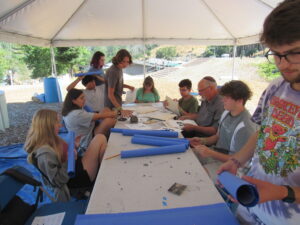 Hevrah also connects teens to justice work in other ways, including through art and Judaism. This summer we worked with Rabbi Peretz Wolf-Prusan for two weeks, studying the lettering of the Torah and the holiness of the written word, carving wood blocks and creating prints of Hebrew letters. We also worked with Rabbi Jim Kaufman, Rabbi Julie Saxe-Taller, and Cantor Ross Wolman, all of whom helped campers explore the strong connection between Judaism and justice. Hevrah campers were able to lead a Shabbat service for the entire camp community and shared the following interpretation of Judaism: We as Jews are commanded to create change, and we can practice Judaism through action and participating in social justice work.
Hevrah also connects teens to justice work in other ways, including through art and Judaism. This summer we worked with Rabbi Peretz Wolf-Prusan for two weeks, studying the lettering of the Torah and the holiness of the written word, carving wood blocks and creating prints of Hebrew letters. We also worked with Rabbi Jim Kaufman, Rabbi Julie Saxe-Taller, and Cantor Ross Wolman, all of whom helped campers explore the strong connection between Judaism and justice. Hevrah campers were able to lead a Shabbat service for the entire camp community and shared the following interpretation of Judaism: We as Jews are commanded to create change, and we can practice Judaism through action and participating in social justice work.
I believe that Hevrah empowers our campers to become leaders, to advocate (for others, for the world and for themselves), and to see themselves as capable of making a difference in the world. Campers enter their Hevrah summer with varied experience doing social justice work, yet we see them leave with new-found senses of agency and autonomy, having gained the knowledge to create change that feels impactful to them. One of our campers, Shira F., shared this reflection about her time at camp:
“Participating in Hevrah was a big leap of faith for me because it was my first summer at Camp Newman, but it turns out that I had nothing to worry about. Not only did I learn about our topic of educational justice, but also life lessons that I will carry with me for the rest of my life. Here are the top three things that I learned during Hevrah!
I learned a lot about educational justice, but I specifically learned about the inequities in the education system. We talked about how the idea that everyone should be “met where they’re at” (equity) is more productive than everyone getting the exact same thing (equality).
Feeling uncomfortable is different than feeling unsafe. Rabbi Micheal Lezak taught us this incredibly valuable lesson when we took a trip to volunteer at Glide Memorial Church in San Francisco. Rabbi Lezak challenged us to take a walk around the block to observe both the beauty and the pain of the Tenderloin District, an area of San Francisco with a lot of poverty. Discerning the difference between feeling uncomfortable and feeling unsafe allowed me to see the beauty of the community, and it is a lesson that I will carry with me forever.
Hevrah is going to change the world! Between the many classes of Hevrah before me and the many that are to come, I know that we all have or will make a difference. People who participate in Hevrah learn how to put ideas into actions, how to talk to legislators, and about the legislative system, all of which are incredibly valuable skills for the “real world”.”
Camp magic can be found anywhere and everywhere at camp, but it is in Hevrah where I truly see it flourish and see the impact that camp and our campers have on each other. The beauty of Hevrah is in that statement, that while camp provides so much for our teens, in Hevrah they also do so much for camp, changing the community for the better each and every year. I am honored to have worked with this session for the last two summers after being a Hevrah camper myself, and I can’t wait to see how the session continues to change, grow, empower, and inspire.
